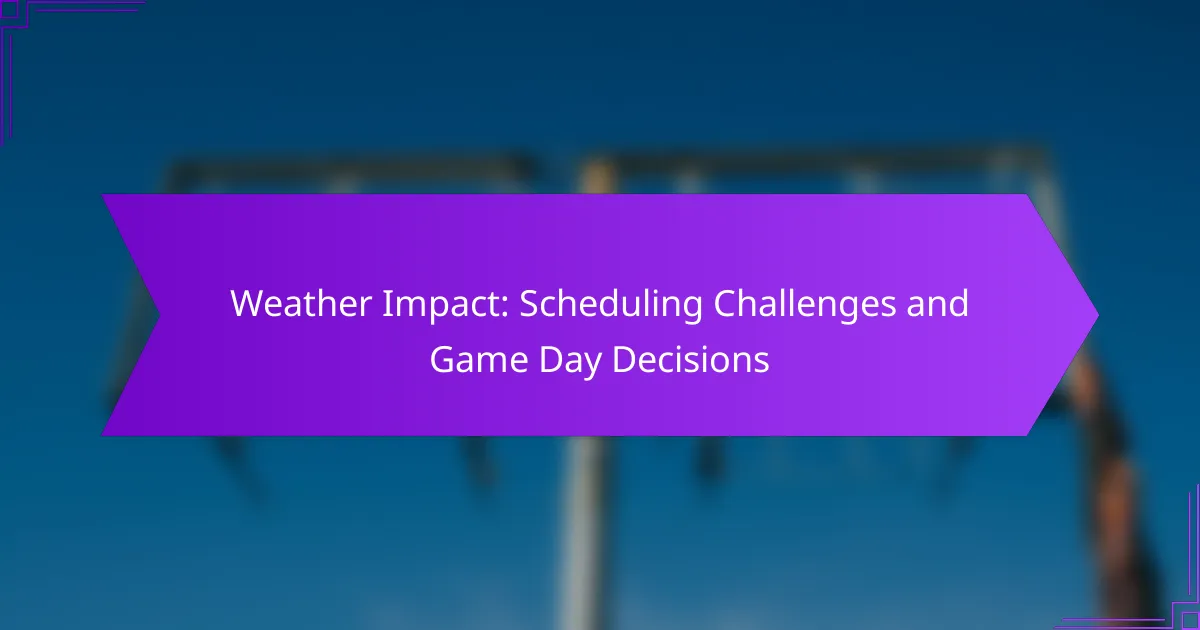Weather plays a crucial role in the scheduling of sports events, often leading to delays, cancellations, or the need for rescheduling to prioritize player safety and game integrity. To navigate these challenges, teams must rely on timely information and strategic planning, employing technology to make informed game day decisions. Proactive preparation, including thorough assessments and staff training, is essential for effectively managing weather-related disruptions and ensuring a smooth experience for all involved.
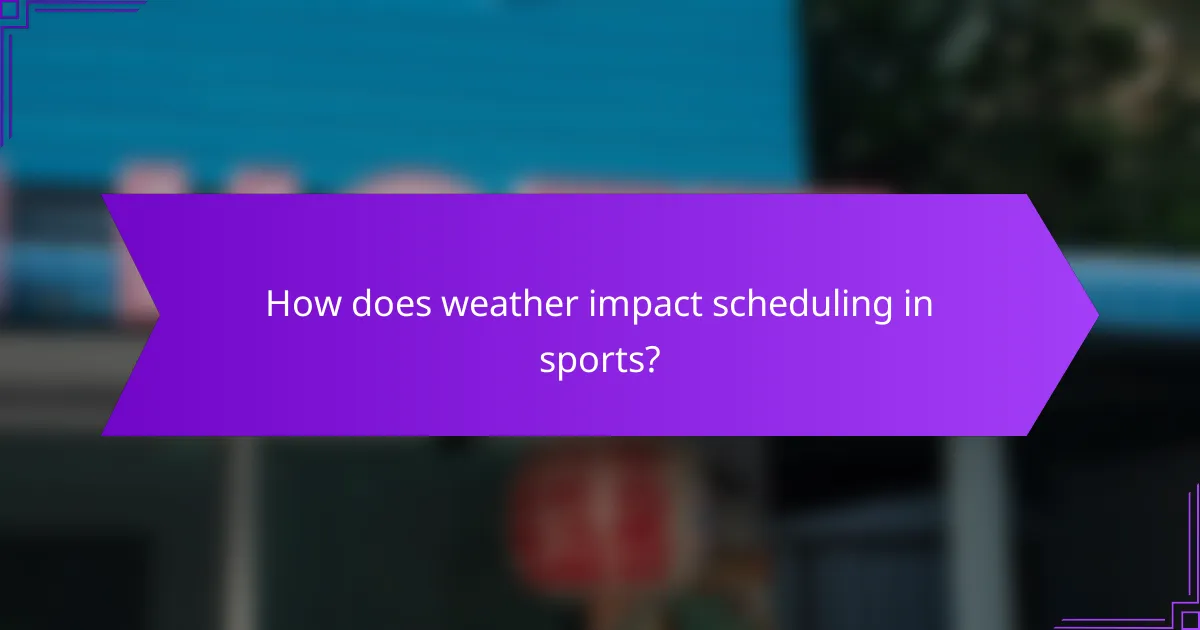
How does weather impact scheduling in sports?
Weather significantly affects scheduling in sports by causing delays, cancellations, or rescheduling of events. Teams and organizers must consider various weather conditions to ensure player safety and maintain the integrity of the game.
Rain delays in baseball
Rain delays are common in baseball, where wet conditions can make the field unsafe for play. When rain occurs, umpires assess the field’s condition, and games may be postponed until it is deemed playable again.
Typically, teams and fans can expect delays ranging from a few minutes to several hours, depending on the severity of the rain. Organizers often have contingency plans, such as rescheduling games or using tarps to protect the field.
Snow interruptions in football
Snow can lead to significant interruptions in football, affecting visibility and field conditions. In many cases, games may be delayed or postponed entirely if snowfall is heavy enough to create unsafe playing conditions.
Teams must prepare for snow by ensuring proper equipment and safety measures are in place. Fans should stay informed about potential delays through official channels, as decisions are often made close to game time based on real-time weather assessments.
Heat advisories in marathon events
Heat advisories can pose serious risks during marathon events, prompting organizers to implement safety protocols. When temperatures rise significantly, races may be delayed or even shortened to protect participants from heat-related illnesses.
Runners should be aware of heat advisories and adjust their hydration strategies accordingly. Organizers often provide additional water stations and cooling zones to help participants manage the heat effectively.

What are the best practices for game day decisions?
Effective game day decisions hinge on timely information and strategic planning. By leveraging technology and preparing for various scenarios, teams can navigate weather-related challenges more efficiently.
Utilizing weather apps for real-time updates
Weather apps provide crucial real-time updates that can significantly impact game day decisions. Teams should select reliable apps that offer accurate forecasts, radar images, and alerts for severe weather conditions.
Consider using multiple sources for weather information to cross-verify data. Popular apps often include features like hourly forecasts and notifications for changing conditions, which can help teams make informed decisions quickly.
Implementing contingency plans
Contingency plans are essential for addressing unexpected weather changes on game day. Teams should outline specific actions for various weather scenarios, such as rain delays or extreme heat, to ensure everyone knows their roles and responsibilities.
For example, if heavy rain is forecasted, having a plan for relocating the game to an indoor facility or rescheduling can minimize disruption. Regularly reviewing and updating these plans based on past experiences can enhance preparedness and response times.
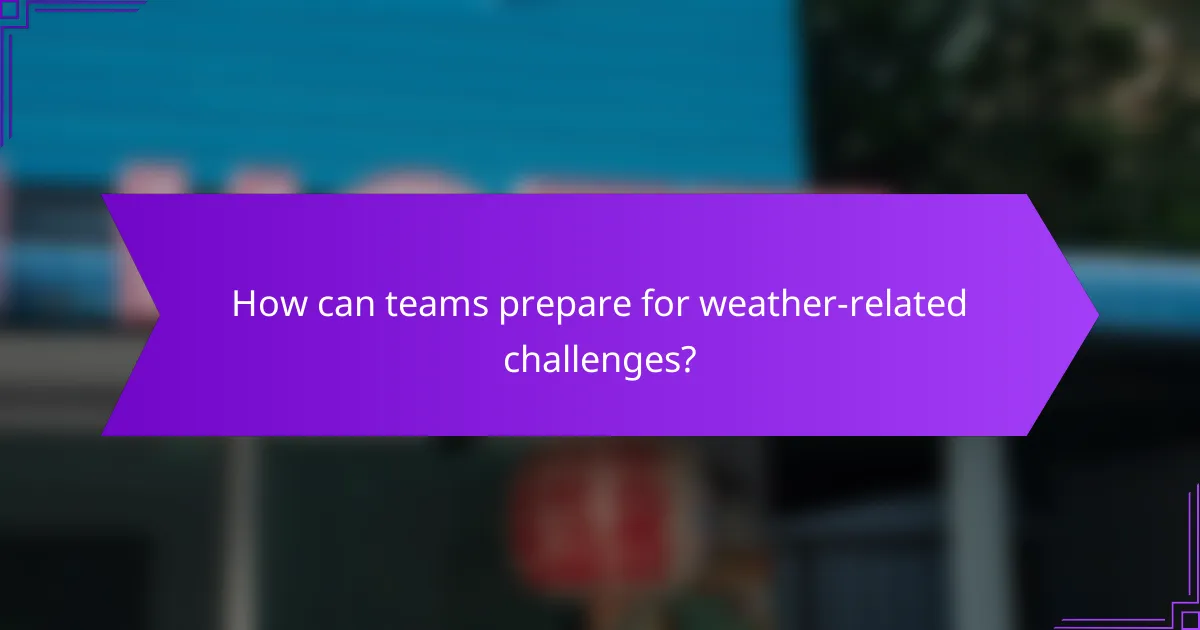
How can teams prepare for weather-related challenges?
Teams can prepare for weather-related challenges by implementing proactive strategies that include thorough assessments and staff training. This preparation helps mitigate risks and ensures that all personnel are ready to respond effectively on game day.
Conducting pre-game weather assessments
Pre-game weather assessments involve monitoring forecasts and evaluating conditions leading up to the event. Teams should utilize reliable weather services and tools to gather real-time data, focusing on factors such as temperature, precipitation, and wind speed.
Establish a timeline for assessments, ideally starting several days before the game. Regular updates should be scheduled to ensure that any changes in weather patterns are quickly communicated to all relevant parties.
Training staff on emergency protocols
Training staff on emergency protocols is essential for ensuring safety during adverse weather conditions. All team members should be familiar with evacuation routes, shelter locations, and communication plans in case of severe weather events.
Conduct regular drills to reinforce these protocols and assess staff readiness. It’s also beneficial to create a checklist of actions to take during different weather scenarios, such as lightning, heavy rain, or extreme heat, to streamline decision-making on game day.
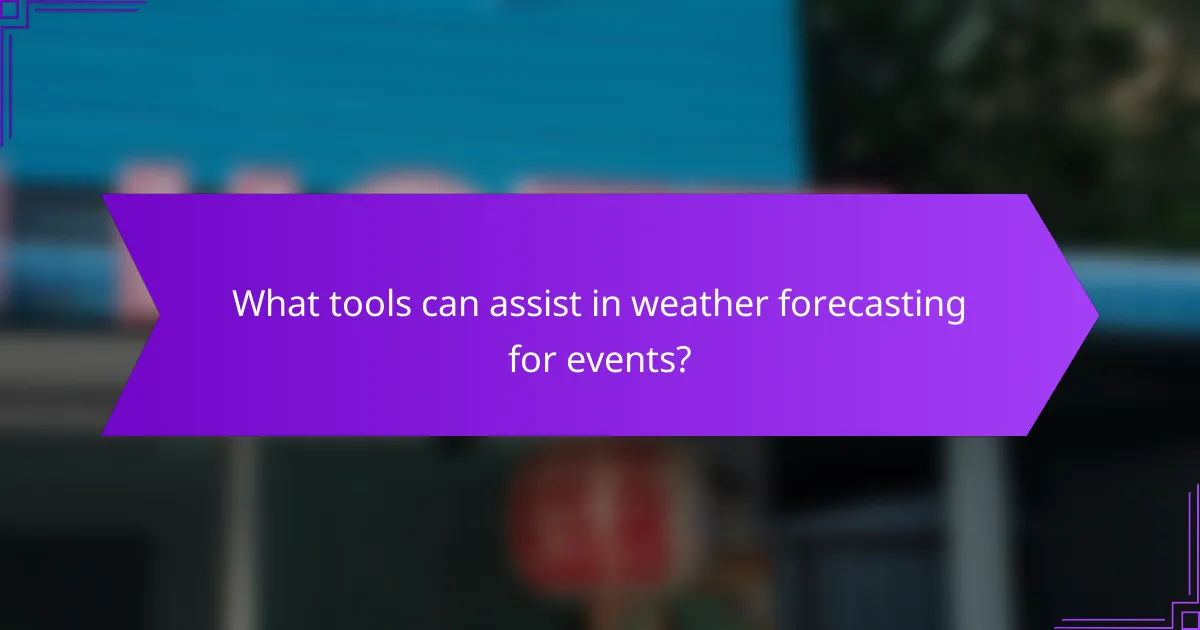
What tools can assist in weather forecasting for events?
Several tools can enhance weather forecasting for events, helping organizers make informed decisions. These tools provide localized data and forecasts that are crucial for planning and executing events successfully.
AccuWeather for localized forecasts
AccuWeather offers detailed localized forecasts that are particularly useful for event organizers. Users can access real-time weather updates, hourly forecasts, and radar maps that show precipitation and storm patterns in specific areas.
For example, if you’re planning an outdoor concert, AccuWeather can provide insights into temperature fluctuations and the likelihood of rain, allowing you to adjust your plans accordingly. Utilizing their mobile app can ensure you receive timely alerts about severe weather changes.
The Weather Channel for event planning
The Weather Channel is another valuable resource for event planning, offering comprehensive weather forecasts and insights. It features a user-friendly interface that allows you to view long-range forecasts, which can help in scheduling events weeks in advance.
Additionally, The Weather Channel provides a “Weather Impact” feature that assesses how weather conditions might affect planned activities. This can be particularly beneficial for outdoor sports events, where conditions like wind or extreme temperatures can impact safety and performance.
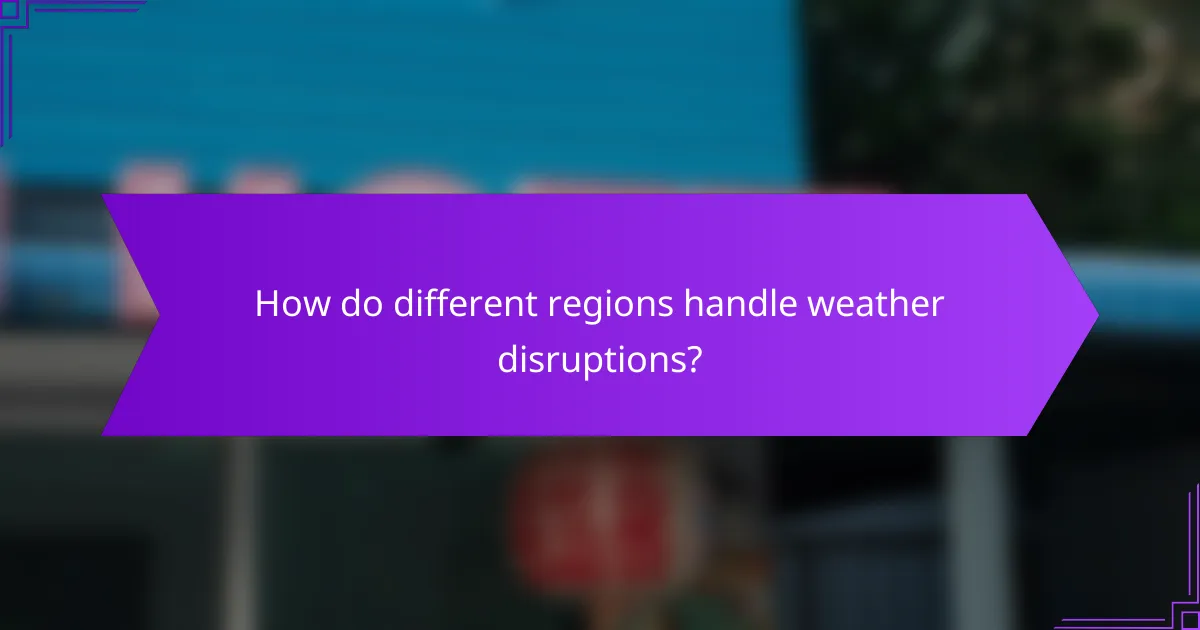
How do different regions handle weather disruptions?
Regions adapt their scheduling and game day decisions to local weather patterns and potential disruptions. Effective strategies often involve preparedness plans, timely communication, and flexible scheduling to ensure safety and minimize impact on events.
Florida’s hurricane preparedness for outdoor games
In Florida, outdoor games must consider the threat of hurricanes, especially during the Atlantic hurricane season from June to November. Organizations typically develop comprehensive hurricane preparedness plans that include evacuation protocols, communication strategies, and contingency scheduling.
Teams often monitor weather forecasts closely and may postpone or relocate games if a hurricane warning is issued. For example, venues may have designated safe zones and resources to ensure fan safety while providing timely updates through social media and local news outlets.
Midwest snow management strategies
In the Midwest, snow can significantly impact outdoor games during winter months. Teams implement snow management strategies that include snow removal from playing surfaces and access areas, as well as using heated equipment to maintain field conditions.
Event organizers often prepare for snow by scheduling games earlier in the day to avoid worsening conditions. They may also provide fans with information on travel advisories and parking options to ensure safe attendance. Using salt or sand on walkways can help prevent slips and falls in icy conditions.
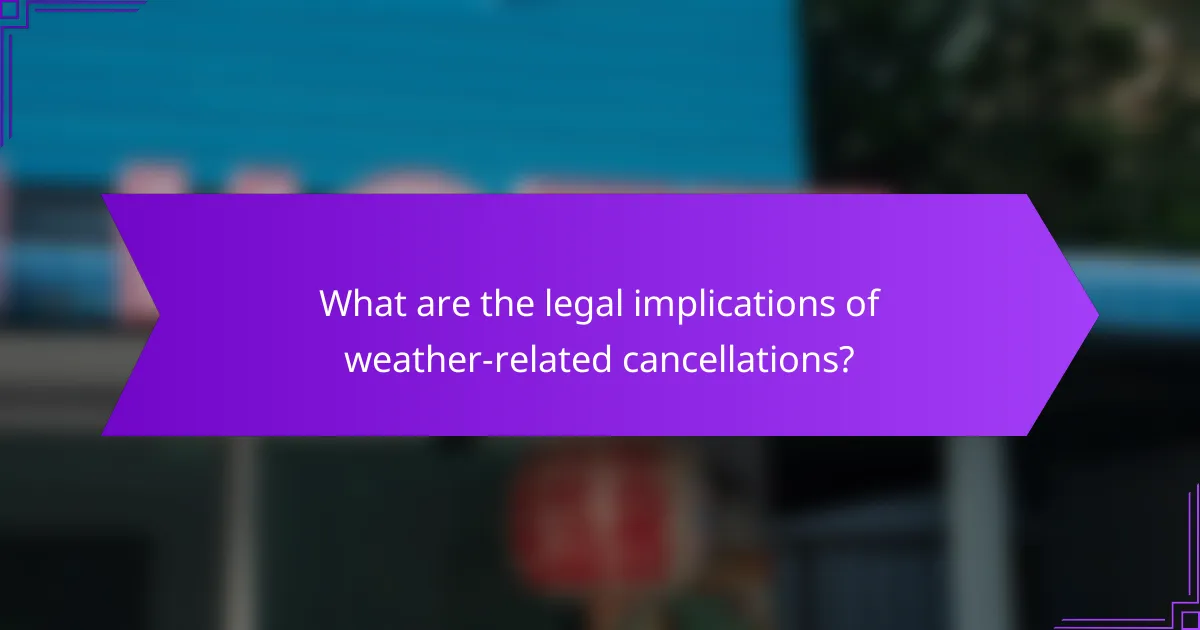
What are the legal implications of weather-related cancellations?
Weather-related cancellations can lead to significant legal implications, particularly concerning liability and contractual obligations. Event organizers must understand their responsibilities and the potential for claims from attendees or vendors due to cancellations caused by adverse weather conditions.
Understanding liability in contract clauses
Liability in contract clauses often defines the responsibilities of each party in the event of cancellations. Contracts should include force majeure clauses that specify how extreme weather events affect obligations. These clauses can protect organizers from liability if they clearly outline the conditions under which cancellations are permissible.
It’s essential to review these clauses carefully and ensure they are comprehensive. For instance, if a contract states that cancellations due to “severe weather” are exempt from penalties, it should specify what constitutes severe weather to avoid disputes.
Insurance options for event cancellations
Insurance can provide financial protection against losses from weather-related cancellations. Event organizers should consider purchasing cancellation insurance, which typically covers costs incurred due to unforeseen weather events. This type of insurance can help recover expenses related to venue rentals, vendor contracts, and marketing costs.
When selecting insurance, compare policies based on coverage limits and exclusions. Some policies may cover only specific weather events, so it’s crucial to understand the terms. Additionally, consider the timing of the policy purchase, as some insurers require coverage to be in place well before the event date to be valid.
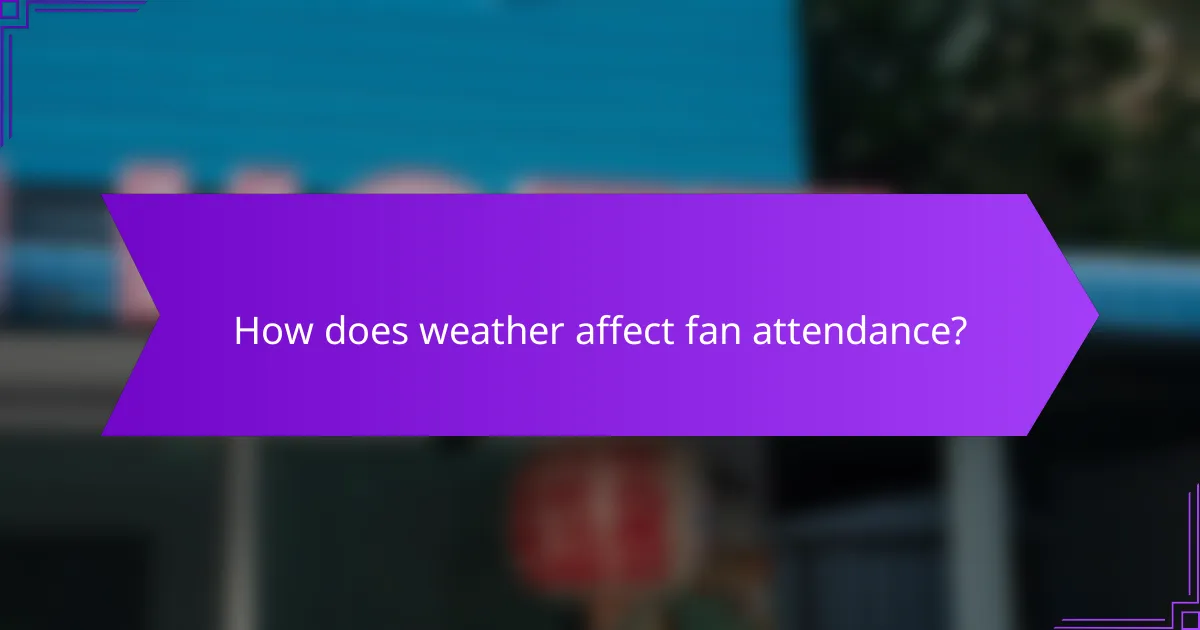
How does weather affect fan attendance?
Weather significantly impacts fan attendance at events, influencing whether people choose to attend or stay home. Factors such as rain, cold temperatures, and extreme heat can deter fans, leading to lower turnout rates.
Impact of rain on outdoor concert turnout
Rain can drastically reduce attendance at outdoor concerts, as many fans prefer to avoid getting wet or uncomfortable. When forecasts predict rain, attendance may drop by a considerable percentage, often in the range of 20-50% compared to dry conditions.
Event organizers can mitigate this by providing covered areas or offering rain-check policies. Additionally, promoting the event’s atmosphere, such as a festive vibe despite the rain, can help encourage attendance.
Cold weather effects on football game audiences
Cold weather can deter fans from attending football games, especially when temperatures drop significantly. Attendance may decline by 15-30% when temperatures fall below freezing, as many fans opt for the comfort of their homes instead.
To counteract this, teams can enhance the game-day experience by offering heated areas, warm beverages, and incentives like discounted tickets for bundled purchases. Clear communication about the weather and available amenities can also help maintain attendance levels during colder months.
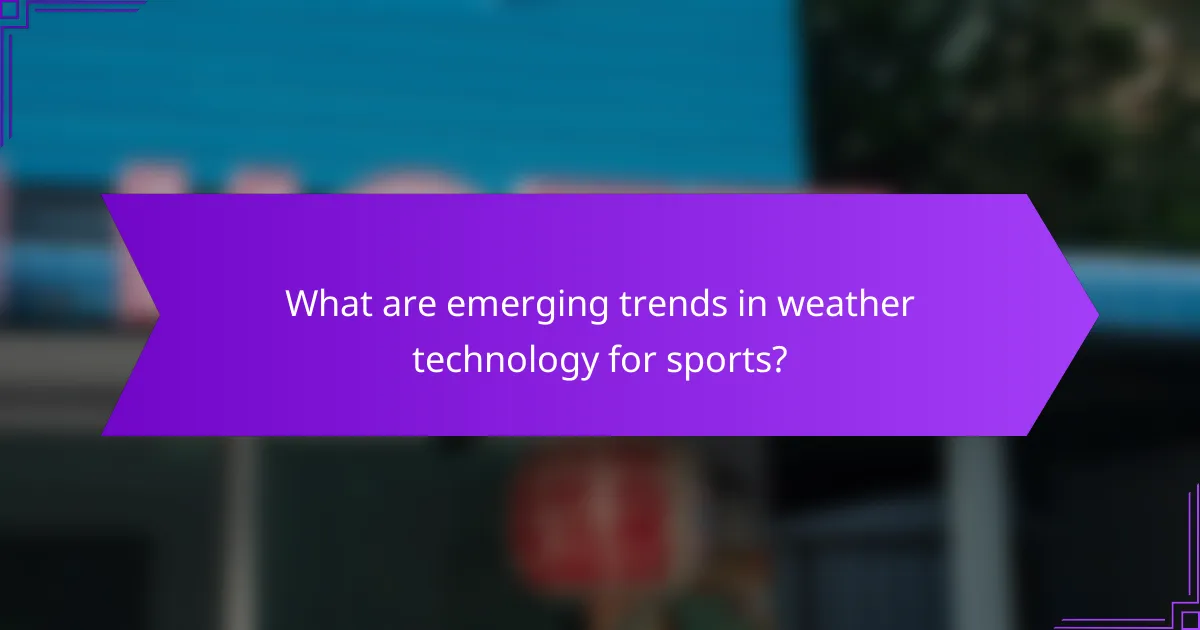
What are emerging trends in weather technology for sports?
Emerging trends in weather technology for sports focus on enhancing the accuracy and timeliness of weather data to improve scheduling and game day decisions. Innovations include advanced forecasting models, real-time data analytics, and mobile applications that provide instant updates to teams and fans.
Advanced Forecasting Models
Advanced forecasting models utilize machine learning and big data to predict weather patterns with greater precision. These models analyze historical weather data alongside current conditions to generate forecasts that can inform game scheduling and safety decisions. For instance, a model might predict the likelihood of rain with a higher degree of accuracy than traditional methods, allowing teams to prepare accordingly.
Teams can leverage these forecasts to make informed decisions about rescheduling games or implementing weather-related safety protocols. This proactive approach minimizes disruptions and enhances the overall experience for players and fans.
Real-Time Data Analytics
Real-time data analytics provide teams with immediate weather updates during games, allowing for quick adjustments. This technology integrates data from various sources, including satellites and weather stations, to deliver live information about temperature, wind speed, and precipitation. For example, if a sudden storm is detected, teams can quickly assess the situation and decide whether to delay or suspend the game.
Utilizing real-time analytics can significantly reduce risks associated with adverse weather conditions, ensuring player safety and maintaining the integrity of the game. Teams should invest in reliable systems that can deliver this data seamlessly during events.
Mobile Applications for Instant Updates
Mobile applications are becoming essential tools for both teams and fans, providing instant weather updates and alerts. These apps often feature customizable notifications that inform users about changing weather conditions relevant to their specific location or event. For example, a fan attending a game can receive alerts about impending rain or temperature drops directly on their smartphone.
By using these applications, teams can keep their audience engaged and informed, enhancing the overall game day experience. It is advisable for teams to promote these apps to ensure fans are aware of potential weather impacts and can plan accordingly.
